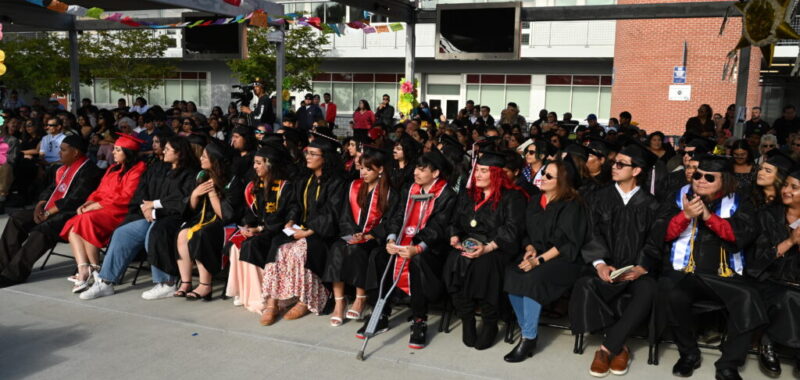
San Diego City College’s Chicano-Latina graduation ceremony in 2024.
Credit: San Diego City College
California college leaders are responding with a mix of uncertainty, resistance and worry over a U.S. Department of Education order to eliminate any race-based programs by the end of the month.
The “dear colleague” letter, published Friday by the department’s Office of Civil Rights, goes far beyond telling colleges they can’t consider race as a factor in admissions. It says colleges that factor race into “admissions, hiring, promotion, compensation, financial aid, prizes, administrative support, discipline, housing, graduation ceremonies, and all other aspects of student, academic, and campus life” are in violation of federal law.
The letter gives colleges until the end of the month to abolish such programs or risk losing federal funds, though it doesn’t specify which funding would be held back.
Some officials at California’s colleges and universities said Tuesday that they have no plans to get rid of those types of programs in dorms, graduation ceremonies, resource centers and other areas. However, others were still determining their next steps amid great uncertainty. Many are concerned about how possible funding losses might hurt campuses and how students might be harmed if there are cuts to programs.
Greg Smith, chancellor of the San Diego Community College District, said he has “no concern about our compliance in anything that we’re currently doing.” He noted that the district already complies with Proposition 209, the 1996 ballot measure that banned public universities in California from considering race in admissions and giving other race-based preferential treatment.
He added, however, that it would be “demoralizing” for students if colleges were forced to get rid of programs designed to “create inclusivity and belonging based on culture and identity.”
“I think it creates a sense of fear that the progress that’s been made in the civil rights going back to the mid-’60s is starting to be undermined,” he added.
The district, one of the largest in the state, is home to San Diego City, San Diego Mesa and San Diego Miramar colleges. Each year, the colleges hold a Rite of Passage Ceremony, a celebration meant to honor the achievements of Black students graduating or transferring.
San Diego Mesa also holds a Raza Grad Ceremony to honor Latino, Hispanic and Indigenous students, while San Diego City holds a similar event and also has a UMOJA Community offering counseling and tutoring to Black students hoping to transfer to a four-year university.
Those programs and other cultural initiatives will continue, Smith said, though he acknowledged that he is concerned about possibly losing federal funding.
The college is currently planning how it would “backfill those funds” if it loses any federal dollars, such as by using reserves in the short term. “We’re really committed to ensuring those programs continue,” Smith said.
The University of California similarly suggested in a statement that the order would not immediately impact its 10 campuses, which have a number of racially themed programs. The letter from the Department of Education’s Office of Civil Rights (OCR) serves as “guidance on the Department’s interpretation of existing anti-discrimination laws and does not name any specific institution,” UC said in its statement.
“It indicates how OCR intends to enforce these legal requirements. Given the UC’s compliance with Prop. 209, we do not use race-based preferences in our practices,” UC added.
UC could be especially vulnerable because it receives nearly $6 billion annually in federal funds for research and other program support and at least $1.7 billion in student financial aid, including Pell grants and work study programs. That does not include federal funds for medical care across UC’s hospitals.
UC Riverside, which has long prided itself on being one of the nation’s most diverse universities, says on its website that it was the first campus to have a professionally staffed Black student resource center and the first UC campus to have an office serving Native American students.
Many campuses across UC and the 23-campus California State University (CSU) also have racially themed dormitory floors, such as the African Black Diaspora Living Learning Community at UC San Diego. The mission of the community is to “establish an environment of personal and academic excellence through the affirmation and celebration of Blackness in its various expressions,” according to the campus website.
CSU was still uncertain of potential impacts as of Tuesday. The system faces its own vulnerabilities if federal funding were to be cut: It estimates that more than $511 million in research expenditures were funded by federal agencies during the 2022-23 academic year.
“As this type of action is unprecedented, we are consulting with the California Attorney General and higher education partners across the country to better understand the statewide impact of this letter,” said Amy Bentley-Smith, a CSU spokesperson.
A spokesperson for the chancellor’s office overseeing California’s 116 community colleges said the office is “in conversations with state and federal partners and providing colleges as much clarity, guidance and support as we can.” Colleges are encouraged to “continue their critical work in alignment with state and federal laws,” the spokesperson added.
Some campuses and college districts declined to comment altogether as they were still assessing the potential impacts of the order. That includes Sacramento State, which has been a vocal leader in programming aimed at helping Black students, and the Los Angeles Community College District, the state’s largest district.

